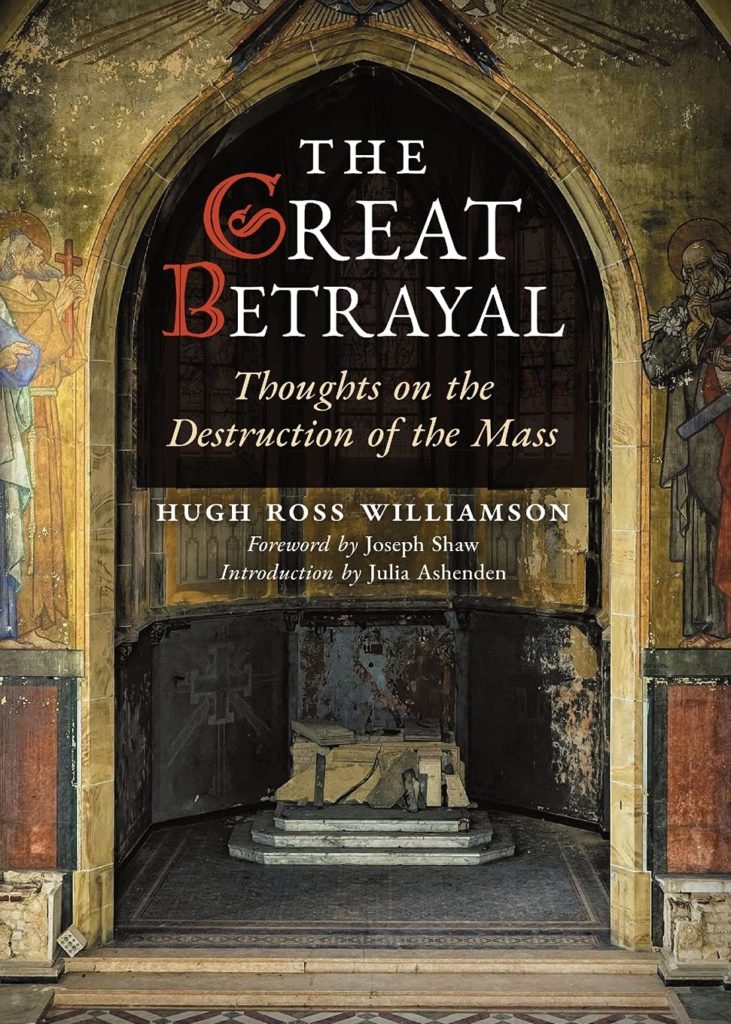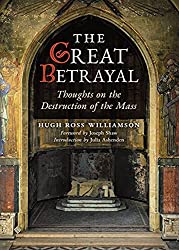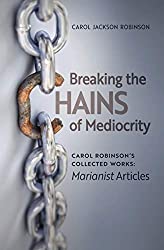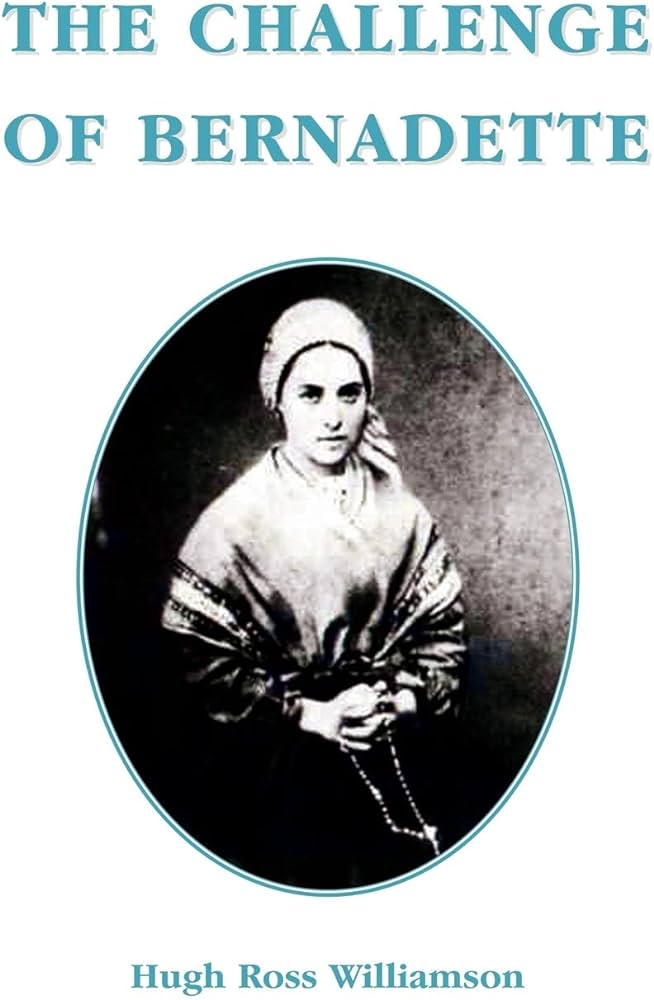
The Great Betrayal by Hugh Ross Williamson is an absolute treasure, a treasure that should be better known. I recommend it to everyone and anyone interested in the Catholic Liturgy, particularly those who want to understand what happened with the radical changes to the Holy Sacrifice of the Mass after Vatican II—and how these changes mirrored earlier events from the English Reformation in the Sixteenth Century.
But it is also relevant today regarding the current liturgical crisis, with the freshly sown division caused by Pope Francis’ Moto Proprio Traditiones Custodes and its shocking reversal of Pope Benedict XVI’s profound and comprehensive work towards liturgical unity, with his Moto Proprio Summorum Pontificum.
Hugh Ross Williamson has a particularly valuable perspective on the liturgy. For he was an Anglo-Catholic priest in the Episcopal or Anglican Church, who celebrated the Traditional Latin liturgy (including, of course, the Roman Canon). That is, until a controversy within the Anglican Church led him to leave Anglican Orders and convert to Catholicism.
That controversy involved allowing members of other low Protestant denominations to receive Communion within the Anglican Church, suggesting or claiming even that there is no difference between them.
This enormous shift in perspective and life experience puts Hugh Ross Williamson in a unique position, whereby he recognised, with acute sensitivity and alarm, a similar situation occurring within the Catholic Church, during and post Vatican II.
Already an acclaimed historian, playwright, author and critic, as well as having been a renowned Anglican preacher, he produced a response. The two small booklets contained in this volume are his response.
Drawing on this parallel between the English Reformation (that ultimately led to the establishment of a very different Church, The Anglican Church) and what was occurring throughout and after the Second Vatican Council, they serve to enlighten the reader of a pattern of destruction to the liturgy, which ultimately led to a completely different form of Catholic worship, the Novus Ordo Mass.
Having celebrated the Holy Sacrifice of the Mass and understood, deeply and devotionally the Roman Canon, the fruit of which he had put together in a book purely on the importance and significance of this “Great Prayer”, as he called it, Hugh Ross Williamson was now watching the Mass being destroyed.
Particularly concerning to him was the threat to the Roman Canon, without which, he believed, Holy Mass would become like unto Cranmer’s ‘Memorial’ pure and simple, thus in his eyes, void.
Hugh Ross Williamson had already authored a book, examining what had occurred after King Henry VIII fatally severed the English Church from Rome. And the then Archbishop of Canterbury, Thomas Cranmer, after Henry’s death, firmly hammered the nails into the coffin, laying the English Catholic Church to rest.
Or rather, he threw the coffin, with the Holy Sacrifice of the Mass and belief in transubstantiation, devotions to Our Lady and the Saints, prayers and Masses for the dead, Rosaries, Scapulas, religious pictures, Holy Water and all that was pious and Catholic, into the fire.
And this same Archbishop, who detested anything “Popish”, including the Body, Blood, Soul and Divinity of Jesus Christ in His Blessed Sacrament, replaced this heavenly endowed sacramental life of grace and means of redemption, with the Lord’s Supper – a simple memorial at a table, with no oblations and no sacrifice to God, except prayers and alms.
Thus, Hugh Ross Williamson watched with horror, this similar path of destruction happen within the Catholic Church in the wake of Vatican II. Immediately he put pen to paper, producing these two booklets, one in 1969, the other a year later, as a plea, if you like, to the English hierarchy and anyone who would listen.
Quoting a little here, let us add some definition to Hugh Ross Williamson’s call for alarm. It is important to note that he made this call, not because he thought the clergy and faithful were partisan, but because they actually had little or no idea as to what was truly going on, just as with the English Reformation. Only a select few were in on the act, so to speak.
Thus, he begins the first booklet, entitled, “The Modern Mass, A Reversion to the Reforms of Cranmer”, with these words:
An English historian is apt, by the nature of things to be suspicious of liturgical change. He knows that in his country it has happened before…what he does not always realise is that few but specialists are interested in so circumscribed a subject and that the general condonation…of certain actions springs not from bad faith but from ignorance.
Hugh Ross Williamson, The Great Betrayal, p. 3.
We see then that this author feels a sense of duty calling him to divulge that which he sees is needed to enlighten the ignorant. He simply cannot remain silent, because he understands, as he puts it at the end of the same first booklet:
The Tridentine Mass, forged as an everlasting weapon against heresy, is to be abandoned to a new form which is only too compatible with the heresies of Cranmer and his associates. Some of us wonder why.
Hugh Ross Williamson, The Great Betrayal, p. 39.
This is serious! Just as it was with the English Reformation! Too much is at stake for Ross Williamson’s cry not to be heard! And the battle is over the Mass.
Thus, in the second booklet, itself called “The Great Betrayal”, Ross Williamson writes:
From one point of view, the Church is the organisation formed to protect the truth that the passport to Eternal Life is the Mass… In the centuries-long assault on the Church by the forces of evil… the main battle has eventually concentrated on the Mass.
Hugh Ross Williamson, The Great Betrayal, p. 47.
These two potent, moving and challenging booklets cover, in a few pages, vast tracts of Church history, particularly focused on the liturgy and the history of its’ destruction, carefully preparing the ground for Ross Williamson’s argument. And they are now available in this beautiful little volume by Arouca Press.
Coupled with them, is an indispensable Preface by Joseph Shaw, which eloquently and critically bridges the decades between the writing of these two small booklets and the situation as it lies today. Shaw thoroughly grapples with this text, affirming and supporting many of Hugh Ross Williamson’s points, whilst highlighting certain problems with his argument.
Added to that is an equally indispensable and lovely little Introduction by Hugh Ross Williamson’s daughter, Julia Ashendon. She sweeps us through a short biography of her father, informing us of his multiple, varied and impressive talents and life experiences. From it, we gain a quick sense of a serious, intelligent man, who truly knows what he is writing about and why he is writing it. Both are invaluable and should not be skipped over.
And thus, we are graced with a treasure: A treasure all the more pertinent, as we find ourselves in a situation today, where noises are being made about a path of further destruction to the liturgy, similar to the direction Ross Williamson witnessed himself.
As someone who was also an Anglican before becoming Roman Catholic, I state this. From the outside, the Anglican and the Catholic rites can look similar. Inwardly though, there is unfathomable difference between the two. Regarding the matter of sanctifying grace pouring into the world, a chasm divides Transubstantiation in the Catholic Mass, from what occurs in the Anglican rite.
For Holy Mass is not a simple memorial. It is the very same sacrifice Jesus offered on Calvary, a living sacrifice for the Redemption of the world, for the living and the dead. This is what Hugh Ross Williamson understood and saw was being destroyed, just as it had been in England with Cranmer’s Reformation.
To buy this book you can either find it here at Arouca Press where you will directly support a small, inspiring Catholic publisher or take the Amazon route:
Foreword for Monarchy by Roger Buck

Buying Books at Amazon Through These Links Gives Us a Commission. This Supports Our Apostolate. Thank You if You Can Help Us Like This!









